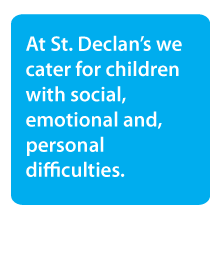St. Declan’s caters for children who, for one reason or another, are achieving below their potential at school. Boys and girls of primary school age, who have run into personal or educational difficulties in another school, can be referred to St. Declan’s. If children have the sort of problems that can be helped by a year or a few years in St. Declan’s, they can transfer here until they are ready to return to mainstream schools. Children may encounter significant emotional difficulties relating to the following:
- personal or educational difficulties
- school refusal
- absence from school due to ongoing medical conditions
- bereavement
- attention deficit hyperactivity disorder (ADHD)
- family related difficulties
- emotional difficulties relating to specific learning difficulties (e.g. dyslexia, dyspraxia)
- attachment disorder (we regularly have fostered and adopted children enrolled)
- expressive and receptive language difficulties
- anxiety and stressors related to high functioning autism
We cater for children who, after a period in St. Declan’s, will generally be ready to integrate into mainstream schools.
St. Declan’s School has a special role in providing a secure, safe and supportive learning environment which caters for each child’s individual needs. At St. Declan’s we wish to maintain a learning environment that allows each child to reach his or her full potential. The rights of pupils and members of staff are enshrined in the school’s Code of Behaviour
At St. Declan’s the small class groups enable each child to receive maximum attention. Teachers also have the following support:
- special needs assistant available to each class
- resource teacher
- art teacher
- school secretary
Parental Participation
The staff welcomes parental interest and support. We encourage frequent communication between home and school as this is vital for each child’s social, personal and educational development. The school has an active parent’s association which participates in many aspects of the school such as
- circulating a newsletter
- involvement in fundraising
- organising the annual Christmas Fair
- representation on the board of management
- informing all parents on school policies
- lobbying on behalf of the children for support services (e.g. speech therapy, occupational therapy)

